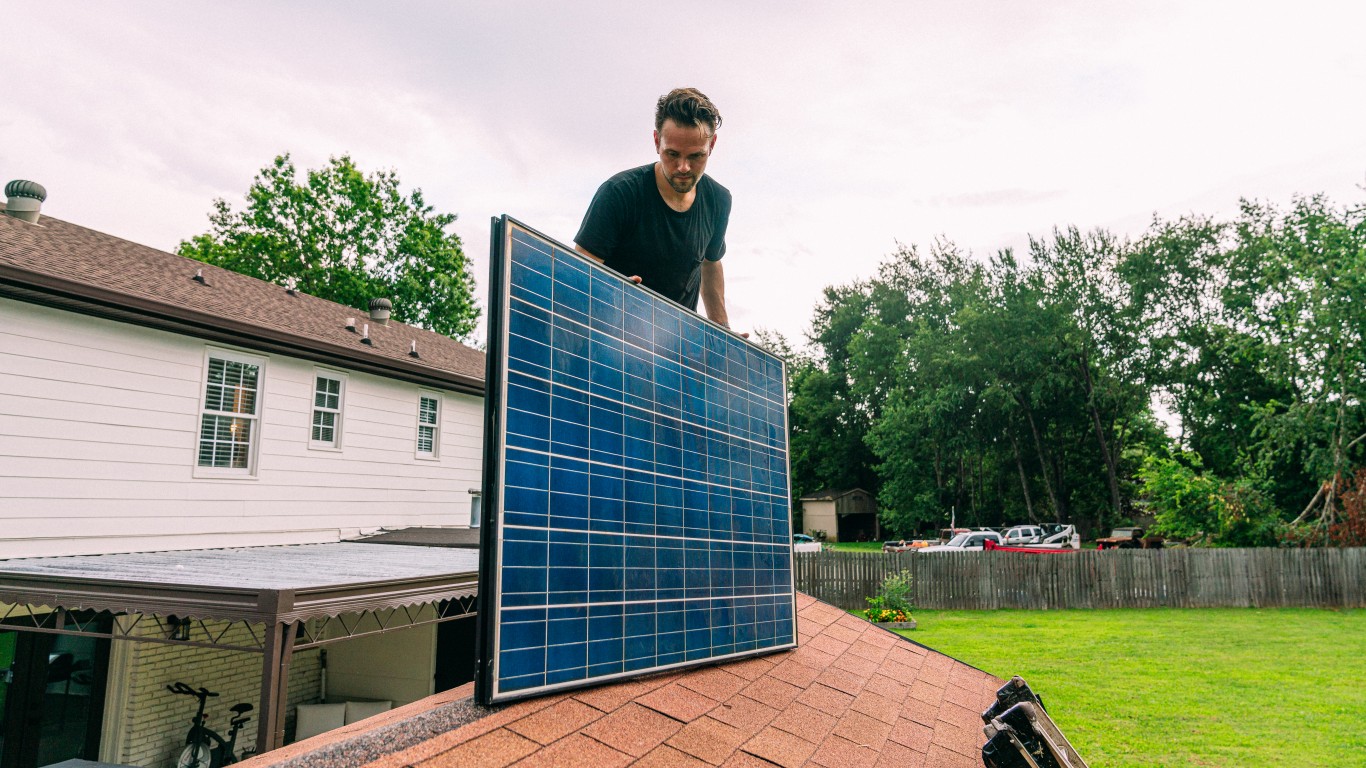The U.S. real estate market has been on the mend for several years. While many Americans witnessed the values of their homes drop precipitously during the recession, markets have been rebounding, with prices in several counties reaching all-time highs.
In several markets, recent gains have led to home prices well above the 2007-2008 levels, when the housing crisis was in full-swing. Home prices in Jefferson County, Kentucky, were 63% higher in March 2014 than they were in 2007. Based on data provided by RealtyTrac, 24/7 Wall St. identified the county-level housing markets that have recovered the most from the housing crisis as of March of this year.
Click here to see eight housing markets at all time highs
Price increases have varying impacts on the health of a local housing market. In some, record home prices simply reflect consistent growth. In places like Marion County, Indiana and Johnson County, Iowa home prices did not fall a great deal and have since recovered steadily since reaching their lows.
Daren Blomquist, vice president at RealtyTrac, explained that most of these counties “are middle America markets that were largely passed over by the boom and bust and have experienced fairly steady growth over the past seven years.” He added that these markets were not subjected to toxic lending practices, which were far more prevalent in other parts of the U.S.
In some markets, however, the long-term sustainability of these price increases may be questionable. San Francisco is among the most expensive real estate markets, and it has recently grown at rates that are potentially concerning. While San Francisco’s market is resilient to price fluctuations due to high volumes of outside investing, “20%-30% year-over-year price appreciation is not sustainable,” Blomquist said.
Many housing markets currently at record highs are very expensive. During the 12 months through March, the overall median home price in six of the eight counties that have recovered the most since the housing crisis was at least $160,000, on the higher end of all county-level prices.
Incomes do not always keep up with home prices, unfortunately. While many of these housing markets may be healthy, their home prices relative to median incomes tended to be quite high. According to Blomquist, when home prices start to outpace incomes, there is cause for concern. Homes in half of the counties that have grown the most were valued at more than four times estimated median household income for 2014, higher than in most counties. San Francisco residents paid nearly 12 times their estimated income for homes.
Relatively good economic conditions also serve to bolster real estate markets, as available jobs will attract home buyers. Low unemployment rates are “a foundational piece that needs to be in place for home prices to rise,” Blomquist said. The unemployment rate in all but one county on this list was lower than the national rate of 6.7% last year.
Based on figures provided by housing data site RealtyTrac, 24/7 Wall St. examined eight county-level housing markets at all-time highs as of March. We ranked counties by the percent change in home prices since 2007 or 2008, with the higher annual average figure serving as the benchmark. In addition to home price figures, RealtyTrac also provided data on foreclosures and median home price-to-income ratios as of the first quarter of 2014. Home price-to-income ratios use property prices for the 12 months through March and estimates for 2014 median household income. Unemployment rates, collected by RealtyTrac from the Bureau of Labor Statistics (BLS), are current as of March.
Here are eight housing markets at all-time highs.
8. Weld County, Colo.
> Pct. change from 2007-2008: 11.1%
> Average March price: $197,488
> Change in foreclosures: -45.8%
> Unemployment rate: 6.5%
Weld County’s housing market has, by some measures, largely recovered from the housing crisis. Foreclosures fell by nearly 46% from the first quarter of 2013 to the first quarter of this year alone. Home prices are also up considerably. An area home cost an average of $197,488 in March, nearly 19% higher than the area’s average home prices in 2008, around the time the housing crisis was well-underway. According to RealyTrac’s Daren Blomquist, the foreclosure crisis hit Colorado fairly early on, which partly explains its lead in the recovery. On the other hand, however, such dramatic increases in home prices may be signs that growth is unsustainable.
ALSO READ: The Most Popular Markets for Home Flipping
7. San Francisco County, Calif.
> Pct. change from 2007-2008: 15.3%
> Average March price: $945,000
> Change in foreclosures: -75.0%
> Unemployment rate: 5.2%
Average home prices in the San Francisco area have been among the most expensive in the country every year since at least 2007, when an area home cost nearly $820,000, on average. As of March, area homes cost $945,000 on average, more than in any other county in the nation. While residents are quite wealthy — household median income is projected to be $78,641 in 2014 — home prices far exceeded local incomes. A typical home cost nearly 12 times the typical income, the second-highest home price to income ratio in the nation. Despite this high ratio, foreclosure rates fell 75% between the first quarters of 2013 and this year. As Blomquist explained, confidence among outside investors likely explains the bulk of San Francisco’s housing price recovery.
6. Johnson County, Iowa
> Pct. change from 2007-2008: 25.5%
> Average March price: $192,000
> Change in foreclosures: 5.4%
> Unemployment rate: 3.2%
Average home prices have risen in Johnson County, Iowa have risen more than 25% since 2007. As of March, a home sold for an average of $192,000, an all-time high. A low unemployment rate in Johnson County and relatively stable statewide economic conditions have likely contributed to the area’s rising home prices. An estimated 3.2% of the county’s workforce was unemployed in March, among the lowest unemployment rates nationwide. There are also indications economic development will continue in the state, further strengthening the county’s housing market. Several companies are flourishing in Iowa. Just last month, Google reached an agreement with MidAmerican Energy — Iowa’s largest energy company — to supply one of its data centers with renewable energy.
ALSO READ: The Best Markets for Home Flipping
5. Henderson County, Texas
> Pct. change from 2007-2008: 30.2%
> Average March price: $192,500
> Change in foreclosures: N/A
> Unemployment rate: 5.7%
Home prices in Henderson County averaged nearly $148,000 in 2008. But in the subsequent years, prices for property in Henderson County dropped considerably. As recently as 2011, the average home price in Henderson County, Texas was just $96,592. However, since then the market has roared back, rising to an average price of $192,500 in March, 30% higher than the 2008 average price. Prices in the area might be expected to fluctuate to some degree, given Henderson County’s size. While the majority of strong housing markets were quite large, Henderson County is exceptionally small, with a population of just 78,558.
4. Marion County, Ind.
> Pct. change from 2007-2008: 39.4%
> Average March price: $116,000
> Change in foreclosures: -35.1%
> Unemployment rate: 6.2%
Since 2008, home prices in Marion County have risen 39.4%, to a current all-time high of $116,000. Unlike much of the U.S., home prices in Indianapolis continued to climb through 2009, when the average home price reached $104,483. Although annual home prices did slightly dip in the following years, they remained above 2008 levels, and began rising again soon thereafter. Even with these gains, the average home price as of March was just $116,000, lower than in most counties for which data was available. Marion County is home to over 900,000 residents, largely living in the city of Indianapolis, with which it shares a unified city-county government.
ALSO READ: Eight Companies The Owe Employees a Raise
3. Buchanan County, Mo.
> Pct. change from 2007-2008: 41.1%
> Average March price: $139,450
> Change in foreclosures: N/A
> Unemployment rate: N/A
The average home price in Buchanan County was exceptionally low as of 2008, at just $98,829. Since the housing crisis, however, average prices have rebounded considerably, rising more than 41% since then, as of this March. Even more remarkable, Buchanan County’s housing market actually hit an even lower point in 2011, when the average price of a home dropped to $93,050. Still, Buchanan County has just under 90,000 residents, far less than most markets where homes are selling at record prices. Such a relatively small population may cause figures to fluctuate considerably over shorter periods of time.
2. Delaware County, Pa.
> Pct. change from 2007-2008: 54.9%
> Average price 2014: $295,000
> Change in foreclosures: 6.1%
> Unemployment rate: 6.1%
Average annual home prices in Delaware County, located in the Philadelphia metro area, only dropped slightly from their 2007 level, when the average price of a home was $185,742. Yet recently, Delaware County home prices have been on the rise, reaching an average of nearly $300,000 in March, among the highest figures nationwide. While high home prices increase homeowners’ equity and often bring down the level of distress, foreclosures in Delaware County increased more than 6% between the first quarters of 2013 and this year. As of March, the median home price over the preceding 12 months of $287,000 was 4.6 times the projected 2014 median household income, a considerably higher ratio than in most U.S. counties.
ALSO READ: States Spending the Most (and Least) on Education
1. Jefferson County, Ky.
> Pct. change from 2007-2008: 63.1%
> Average March price: $160,000
> Change in foreclosures: -33.0%
> Unemployment rate: 8.1%
The average home price in Jefferson County, which merged with the city of Louisville in 2003, was just $73,879 in 2009, among the lower average home prices nationwide. Since then, however, home values have increased dramatically, rising every year to reach $160,000 on average in 2014. As a result, the area’s home prices are up 63% from Jefferson County’s 2007 average home price of $92,133. Foreclosures, too, are on the decline, having fallen 33% between the first quarter of 2013 and the first quarter of 2014. A report from the Federal Reserve Bank of St. Louis last year profiled Louisville as an example of a metro area that had successfully transitioned from an industrial to a service-based economy.
Take Charge of Your Retirement In Just A Few Minutes (Sponsor)
Retirement planning doesn’t have to feel overwhelming. The key is finding expert guidance—and SmartAsset’s simple quiz makes it easier than ever for you to connect with a vetted financial advisor.
Here’s how it works:
- Answer a Few Simple Questions. Tell us a bit about your goals and preferences—it only takes a few minutes!
- Get Matched with Vetted Advisors Our smart tool matches you with up to three pre-screened, vetted advisors who serve your area and are held to a fiduciary standard to act in your best interests. Click here to begin
- Choose Your Fit Review their profiles, schedule an introductory call (or meet in person), and select the advisor who feel is right for you.
Why wait? Start building the retirement you’ve always dreamed of. Click here to get started today!
Thank you for reading! Have some feedback for us?
Contact the 24/7 Wall St. editorial team.




